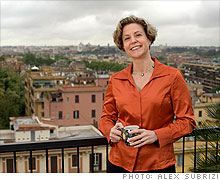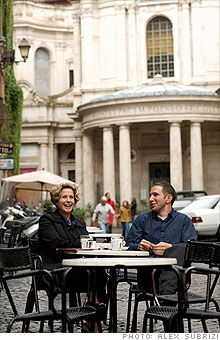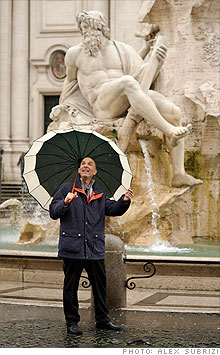A career coach's world without borders
An American entrepreneur runs a global career-coaching business from the Eternal City.
 |
| Megan Fitzgerald, CEO of Career by Choice |
 |
| Fitzgerald helps client Jason Pittelli with his Roman tour business. |
 |
| Expat Brian Rothbart published a book under Fitzgerald's guidance. |
ROME (Fortune Small Business) -- In a rented conference room near Emperor Hadrian's tomb, career coach Megan Fitzgerald greets two regular clients. Though all three are American expatriates, there's a good deal of Mediterranean-style cheek kissing. Then it's down to business on this bright February morning. Physician and first-time author Brian Rothbart, 65, and his wife, Linda Penzabene, 55, are unhappy about the dust jacket of their book, Forever Free From Chronic Pain. The colors are too dark, they fret.
"Well, it's close," soothes Fitzgerald, 38, a peppy New York City-born blonde. "Sometimes you've just got to embrace the 80% that works."
The couple turned to Fitzgerald after they relocated to Rome, where a local medical institute had offered Rothbart a research post. Before they signed on with Fitzgerald, Rothbart's Web site offered 450 pages of highly technical articles chronicling his 40-year search for a drug-free cure for chronic pain. Fitzgerald persuaded him to streamline his message and bypass the medical establishment. In the 2� years they've worked together, meeting every other week, Fitzgerald has helped the couple launch a new site, write the book, find a publisher, start a Facebook page and make a DVD. Some mornings she e-mails them a to-do list, up to 20 items long.
"We're here to start a revolution," Fitzgerald says to Rothbart, leaning over the conference table. "You've spent your life coming up with incredible discoveries, transforming people's lives and releasing them from pain. We are here to empower people to take charge of their lives!"
As an American career coach in Rome, Fitzgerald is also on the front lines of a global revolution. Career coaching is a fast-growing and largely unregulated market. A decade ago the Kentucky-based International Coach Federation had 2,100 members; that number has since grown eightfold, to 16,600. In 2004 the Harvard Business Review estimated that executive coaching alone was a $1 billion industry. Aided by Web technology that enables remote coaching from anywhere, the business is gaining ground in some unexpected corners of the world.
Fitzgerald is benefiting from a worldwide surge in career coaching within corporations. Her three-year-old company, Career by Choice, grossed 56,000 euros ($79,000) last year, up more than 100% over 2007. Her client list includes the SDA Bocconi School of Management in Milan as well as Microsoft (MSFT, Fortune 500), which hired her as a coach for Accelerate, its in-house program for high-potential marketing executives.
"Once, coaching was about fixing the few people who were having performance problems," says Brian Underhill, founder of CoachSource, a California-based institute that provides leadership coaching. "Now companies are doing it for their best and brightest."
Which isn't to say career coaches are immune to the global recession. In the fall Fitzgerald will begin holding group coaching seminars to cut clients' costs. She's also doing pro bono work for downsized financial industry workers. And not everyone sees much value in this latest American management fad.
"What a gleaming BMW in the car park did for the corporate achiever in the 1980s, an executive coach is doing today," sniffs Chris Bones of Britain's Henley Management College. "Frankly, the coaching investment has a far less guaranteed chance of success."
Fitzgerald has been in the coaching business informally since she graduated from Brown University in 1992. In her twenties and early thirties she taught entrepreneurship training courses for international aid organizations, working with clients ranging from Tanzanian cheesemakers to Romanian admen. Somehow she found time to co-found a nonprofit organization devoted to HIV-AIDS education. "My proudest moment was putting a condom pin on Brad Pitt," she recalls with a twinkle.
In 2003 Fitzgerald was preparing to settle down in London with her husband, Josh, who works for Cisco Systems (CSCO, Fortune 500). Two days before their scheduled move, she was diagnosed with lymphoma. The relocation was put on hold, and Fitzgerald spent the next 10 months battling cancer. She logged a lot of hours in waiting rooms, offering career advice to fellow patients.
At one radiation session Fitzgerald met a telecom consultant who had been forced to abandon several projects because of her health and feared she might never work again. Fitzgerald gave her a pep talk, arguing that the cancer ordeal would enrich the skills she brought to her job. The woman was impressed. "You're really good at this," she told Fitzgerald. "You should be in business for yourself."
That wasn't the first time Fitzgerald had been told she had a talent for career coaching. Still, she resisted launching a business for four more years. It just seemed like too much work, she says now. By 2006 she and Josh were in London, where she worked as a consultant for international aid organizations.
But the couple were ready for warmer weather, Josh's job let him work from any major European city, and he had grown up listening to his Italian grandmother's tales of the old country. Rome felt right to Fitzgerald when she visited. (A devoted urbanite, she says city walks help her solve problems.)
Fitzgerald didn't know a lick of Italian and had no entr�e into the local job market. So she decided to launch a company that catered to English-speaking expatriates.
Getting started was an adventure in itself. Italy moves at two distinct paces, Fitzgerald discovered: The bureaucracy is tediously slow, while the legislature works at light speed. "By the time your papers arrive at the top of some bureaucrat's pile, the laws have changed," she says.
Five months after she submitted her application for a residence permit, new rules forced her to fly back to the U.S., hunt down new documents, submit them (translated and notarized) to the Italian Consulate and then return to Rome and begin the process again. Like many frustrated expatriates before her, Fitzgerald ended up hiring an international relocation agency. "Unless you've got a slick Italian uncle who knows the Pope really well," she says, "I don't recommend that anyone do it on their own."
Today Fitzgerald runs a global coaching business out of her sunny apartment overlooking Rome's Trastevere neighborhood, working with 23 clients in 12 countries. She usually charges 600 euros ($800) a month for weekly sessions and e-mails. She has never met her three assistants, who live in Colorado, Canada and the Philippines, but she relies on them for a variety of tasks, from setting up Facebook pages to doing industry research and interview transcription.
Fitzgerald spends most workdays on Skype, using its free video chat feature to "meet with" her far-flung clients. Take Roberta Zelari, an Italian human resources executive who had tired of her job in Rome and wanted to work abroad. With Fitzgerald's help she landed another HR job in Al Ain, a city in the United Arab Emirates. Skype is banned in Al Ain, so every week Zelari drives an hour and a half to Dubai, where she gets on Skype to plot her next career move with Fitzgerald.
In addition to her global network, Fitzgerald has signed up numerous expat executives in Rome. Jason Pittelli, CEO of the Rome-based tour company Love4Adventure, started working with Fitzgerald in January 2007. The 30-year-old Canadian had been running tours with one other guide for 10 years and wanted to expand.
Two years later, Pittelli employs 43 guides in 10 cities. Fitzgerald helped him revamp his Web site and coached him on how to loosen his grip on the business and train others to work for him. Running a two-person business vs. running a small global business, Pittelli notes, "is the difference between a scooter and a Ferrari."
Then there's Tony Piccolo, who works in information management for the United Nations. Piccolo was passionate about the burgeoning green industry of aquatic biofuels, but he had no luck getting his U.N. bosses to pay any attention. "It's such a brand-new field that nobody knows much about it," he says.
With Fitzgerald's help Piccolo set up a blog and enrolled in an M.B.A. program in energy and sustainable development at the University of Malta in Rome. Now Piccolo has published five articles on biofuels and is writing white papers for companies in the U.S.
Back in the conference room, Rothbart and Penzabene wrap up their session with Fitzgerald. After another round of cheek kissing, the couple leave much happier than when they arrived.
"We thank God every morning that we found her," says Penzabene. "She's tough. It can be hard to move my husband, but she figured him out." ![]()
-
The Cheesecake Factory created smaller portions to survive the downturn. Play
-
A breeder of award-winning marijuana seeds is following the money and heading to the U.S. More
-
Most small businesses die within five years, but Amish businesses have a survival rate north of 90%. More
-
The 10 most popular franchise brands over the past decade -- and their failure rates. More
-
These firms are the last left in America making iconic products now in their twilight. More














